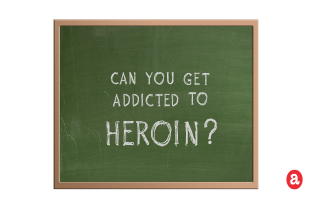Yes.
In fact, heroin is a highly addictive drug that strongly affects the central nervous system. Its frequent use leads to addiction. Continue reading more here to find out how heroin affects the brain and how it affects long-term health. We also explain why heroin users go on to become addicts. Finally, we invite your questions and comments at the end (we respond to all legitimate questions with a personal response).
Heroin chemistry and use
Heroin is a psychoactive depressant drug processed from morphine, itself a naturally occurring opium alkaloid extracted from certain varieties of poppy plants. Heroin can be found as a white and brownish powder and is frequently “cut” with sugars. Pure white powder heroin has a bitter taste and is usually snorted or smoked, while “black tar” heroin can be found in hard and sticky form and is usually injected into veins, muscles and under the skin. While all routes of administration are risky, injecting heroin has the highest risk potential of all, with high risk of infections and blood-borne diseases.
What medicines contain heroin?
Heroin goes under the clinical name ‘diamorphine’ when used therapeutically as an analgesic. It is legal in some countries to be used for treating chronic and acute pain and in obstetric epidural anesthesia because as a stronger analgesic than morphine that lasts shorter. Because of heroin’s addictive-ness, in the U.S., heroin has no medical use and is a Schedule I drug under the Controlled Substances Act making its possession, sales, or distribution illegal.
What does heroin do the brain?
Once it reaches the brain, heroin gets converted into morphine and binds to the molecules on the opioid receptors of the central nervous system. These receptors control automatic processes such as blood pressure, arousal, and respiration and are also involved in the perception of pain, hence its analgesic use.
The first feeling that heroin can evoke is one of euphoria (an extreme sense of well-being) followed by dry mouth, flushed skin, a heavy feeling in the extremities, and clouded thinking … followed by a stage of drowsiness. To maintain the euphoric feeling, users usually go for another dose.
Frequent heroin use changes the the structure and function of the brain, causing long-term consequences to the body’s chemistry and nervous system. With repeated use, dependence on heroin symptoms emerge: First, a person becomes tolerant to heroin and has to increase the dose in order to achieve the same intensity of effect. Another way it affects the brain is by triggering dependence to the drug. The brain of a frequent heroin user gets used to the presence of the drug over time and the person experiences withdrawal symptoms when the dose is suddenly lowered or ceased.
How do you get addicted to heroin?
Habitual use is what causes addiction. In other words, using heroin time and time again is what leads to addiction. The first of the signs of addiction to heroin is craving. Obsessive or compulsive thinking about heroin, its use, or acquisition can point to addiction. Additionally, loss of control is a sign of addiction. Not being able to stop, or taking more heroin (more often) than planned can signal heroin. Further, tolerance can be a sign of addiction to heroin: the body needs a higher dose to feel initial effect and so people tend to increase their dose over time. Another critical point for developing addiction is when people take the drug repeatedly over a short period of time so as to remain euphoric.
Who gets addicted to heroin?
In a report which provides an overview of heroin use in the United States, the NIH expresses concern about the increased number of people who have started to use heroin. According to this report, the number of initiates has been steadily rising since 2007, especially among young adults from 18 to 25 years old. Heroin use among the general population remains low. However, everyone can get addicted to heroin after regularly using it.
How to avoid heroin addiction?
The safest way to avoid heroin addiction is to simply avoid using heroin. If you do take heroin occasionally and think there is no way you could get addicted, you are mistaken. Do not underestimate its powerful addictive properties. Educate yourself about the negative consequences of heroin use and avoid socializing with people who use it.
Questions about heroin dependency
Please let us know if you have questions about heroin or its addictive properties. Or, if you have a personal experience, please feel free to share it with our other readers. We will try to respond to all legitimate queries, personally and promptly.









Related Posts